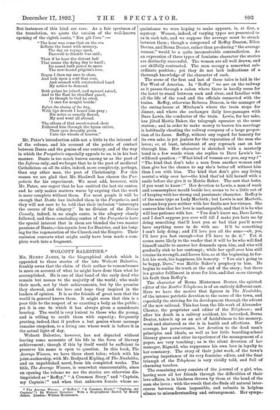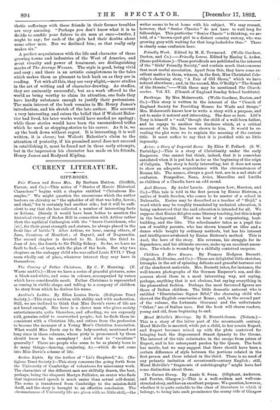WOLCOTT BALESTIER.*
MR. HENRY JAMES, in the biographical sketch which is appended to these stories of the late Wolcott Balestier, frankly owns that the claim of their author to remembrance is more on account of what he might have done than what he accomplished. He is one of that band of the early dead who remain but names to the majority of the world ; who made their mark, not by their achievements, but by the promise they showed, and the love and hope they inspired in the leaders of opinion. It is as the friends of great men that the world in general knows them. It might seem that this is a poor title to the respect of so exacting a body as the public ; yet it is one to which it has always given a considerate hearing. The world is very lenient to those who die young, and is willing to credit them with capacity ; frequently proving, indeed, that it prefers a lost genius whose message remains unspoken, to a living one whose work is before it in the actual light of day.
Wolcott Balestier, however, has not departed without leaving some memento of his life in the form of literary achievement; though if this by itself would be sufficient to preserve his name is open to question. In this book, The Average Woman, we have three short tales ; which with his joint-authorship, with Mr. Rudyard Kipling, of The Naulahka, and an unpublished novel, form his completed works. The title, The Average Woman, is somewhat unaccountable, since on opening the volume we see the stories are otherwise dis- tinguished as " Reffey," " A Common Story," and " Captain, my Captain!" and when that unknown female whose ac- • The Average Woman. (" Reify}, ;" "A Common Story:" " CaPtain, my Captain 1 ") By Wolcott Balestier. With a Biographical Sketch by Henry James. London: William Heinemann. quaintance we were hoping to make appears, is, at first, a mystery. Women, indeed, of varying types are presented to us in each tale, and we suppose the average must be struck between them ; though a compound of Reffey Deacon, Ellen Devius, and Berna Dexter, rather than producing "the average woman," would be a quite inconceivable contradiction. As an expression of three types of feminine character the stories are distinctly successful. The women are all well drawn, and are skilfully contrasted. The men occupy a somewhat sub- ordinate position ; yet they do not lack indications of a thorough knowledge of the character of each.
The scene of the first and last of these tales is laid in the Far West of America. In "Reffey " we are on the railway as it passes through a caiion where there is hardly room for the hotel to stand between rock and river, and familiar with all the life of the road and the officials connected with the trains. Reffey, otherwise Rebecca Deacon, is the manager of the eating-house at Mitcham's where the train stops for dinner, and where she exchanges daily love-passages with Dave Lewis, the conductor of the train. Lewis, for her sake, has jilted Mattie Baker, the telegraph operator at the same station ; and in order to make money to hasten his marriage is habitually cheating the railway company of a large propor- tion of its fares. Reffey, without any regard for honesty for its own sake, is yet jealous for the reputation of the man she loves ; or, at least, intolerant of any reproach cast on her through him. Her character is sketched with a masterly hand in a few words when she replies to Dave Lewis's be- wildered question : " What kind of woman are you, any way ?" " The kind that don't take a man from another woman and then give her the chance to say she's better off without him than I am with him. The kind that don't give any living mortal a whip over her—the kind that'ud kill herself with a smile before she give it to Mattie Baker. The sort that hates, if you want to know !" Her devotion to Lewis, a man of weak and commonplace mould beside her, seems to be a little out of of keeping with her strong and passionate character. Reffey is of the same type as Lady Macbeth ; but Lewis is not Macbeth,
and can keep pace neither with her faults nor her virtues. She assures him that her love is unchangeable, and that it is he who
will lose patience with her. " You don't know me, Dave Lewis,. and I don't suppose you ever will till I make you hate me by doing something that'll hurt you so bad that you'll never have anything more to do with me. It'll be something I can't help doing ; and I'll love you all the same—oh, yes, I'll love you fast enough—bat I'll have to do it." Yet it seems more likely to the reader that it will be he who will find himself unable to answer her demands upon him, and who will gradually sink to her contempt; while her spell over him still retains its strength, and forces him, as at the beginning, to for- feit his work, his happiness, his honesty. " You ain't going to be happy, Dave," was Mattie Baker's prophecy to him. He begins to realise its truth at the end of the story ; but there is a greater fulfilment in store for him, and that more through his fault than Reffey's.
The character of Berna Minterman Dexter, the spirited editor of the Rustler Telepheme, is of an entirely different cast. Here we have the motive that figures in The Naulahka, of the intense patriotic devotion to the cause of the town, and especially the striving for its development through the advent of the new railroad. This has been the life-work of Alexander Chester, the proprietor and editor of the Telepheme; and after his death in a railway accident, his betrothed, Berna Dexter, takes it up as an act of faithfulness to his memory, weak and shattered as she is in health and affections. Her courage, her perseverance, her devotion to the dead man's principles and ideals, as well as her little boarding-school' literary graces and utter inexperience of the management of a paper, are very touching ; as is the silent devotion of her manager, Rignold, who suppresses his own love in loyalty to her constancy. The story of their joint work, of the town's growing impatience of its very feminine editor, and the final triumph of the Telephone is very vividly told, and full of charming touches.
The remaining story consists of the journal of a girl, who, having seen all her friends through the difficulties of their love-affairs, is in kindness thrown by them at the head of the man she loves ; with the result that she finds all natural inter- course between them impossible, and submits in helpless. silence to misunderstanding and estrangement. Her sympa.-
thetic sufferings with these friends in their former troubles are very amusing. "Perhaps you don't know what it is to decide to confide your future to six men at once—twelve, I ought to say; for each of the girls had their doubts about some other man. But we declined him; so that really only makes six."
A perfect acquaintance with the life and character of these growing towns and industries of the West of America, and great vivacity and power of treatment, are distinguishing marks of The Average Woman. The style is good, being vivid and easy ; and there is an artistic completeness in the tales which makes them as pleasant to look back on as they are in reading. Yet with all this, they are very slight,—mere studies in the art of writing and of character-drawing. As studies, they are eminently successful; but as a work offered to the world as being worthy to claim its attention, one feels they have hardly substance enough to justify their pretensions. The main interest of the book remains in Mr. Henry James's introduction, and his sketch of the late author. His account s very interesting, and raises the belief that if Wolcott Bales- tier had lived, his later works would have needed no apology; while these stories would have been the unconsidered trifles which he used as stepping-stories to his career. As it is, we ay the book down without regret. It is interesting, it is well written, it is clever; but Wolcott Balestier's claim to the attention of posterity, if his promised novel does not succeed in establishing it, must be found not in these early attempts, but in the impression his character has made on his friends, Henry James and Rudyard Kipling.







































 Previous page
Previous page